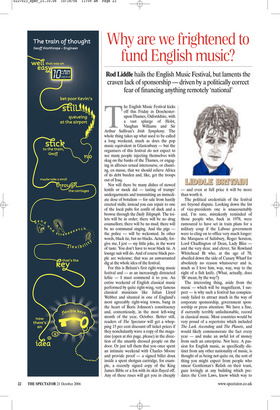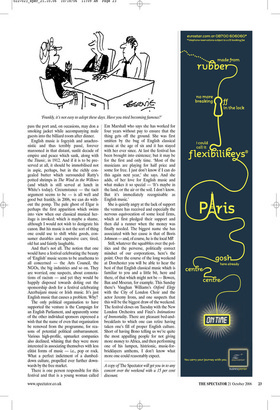Why are we frightened to fund English music?
Rod Liddle hails the English Music Festival, but laments the craven lack of sponsorship — driven by a politically correct fear of financing anything remotely ‘national’ The English Music Festival kicks off this Friday in Dorchesterupon-Thames, Oxfordshire, with a vast splurge of Holst, Vaughan Williams and Sir Arthur Sullivan’s Irish Symphony. The whole thing takes up what used to be called a long weekend, much as does the pop music equivalent in Glastonbury — but the organisers of this festival do not expect to see many people injecting themselves with skag on the banks of the Thames, or engaging in alfresco sexual intercourse, or chanting, en masse, that we should relieve Africa of its debt burden and, like, get the troops out of Iraq.
Nor will there be many dishes of stewed lentils or mock dal — tasting of tramps’ undergarments and transmitting an immediate dose of botulism — for sale from hastily erected stalls; instead you can repair to one of the local pubs for confit of duck and a browse through the Daily Telegraph. The toilets will be in order; there will be no drug counsellors; there will be no mud; there will be no communal singing. And the pigs the police — will be welcomed. In other words, black tie, but no blacks. Actually, forgive me, I jest — my little joke, in the worst of taste. You don’t have to wear black tie. A lounge suit will do. And of course black people are welcome; that was an unwarranted dig at the whole idea of the festival.
For this is Britain’s first right-wing music festival and — as an increasingly distracted leftie — I must commend it to you. An entire weekend of English classical music performed by quite right-wing, very famous classical musicians like Julian Lloyd Webber and situated in one of England’s most agreeably right-wing towns, bang in the heart of Boris Johnson’s constituency and, contentiously, in the most left-wing month of the year, October. Better still, readers of The Spectator will get a whopping 15 per cent discount off ticket prices if they nonchalantly wave a copy of the magazine (open at this page, please) in the direction of the smartly dressed people on the door. Or just tell them that you once spent an intimate weekend with Charles Moore and provide proof — a signed billet doux inside a spent shotgun cartridge, for example, a recently signed copy of the King James Bible or a fox with its skin flayed off. Any of these ruses will get you in cheaply — and even at full price it will be more than worth it.
The political credentials of the festival are beyond dispute. Looking down the list of vice-presidents one is unaccountably and, I’m sure, mistakenly reminded of those people who, back in 1978, were rumoured to have set in train plans for a military coup if the Labour government were to cling on to office very much longer: the Marquess of Salisbury, Roger Scruton, Lord Chadlington of Dean, Lady Bliss and the very dear, and clever, Sir Rowland Whitehead Bt who, at the age of 70, abseiled down the side of Canary Wharf for absolutely no reason whatsoever and is, much as I love him, way, way, way to the right of a fish knife. (What, actually, does ‘Bt’ mean, by the way?) The interesting thing, aside from the music — which will be magnificent, I suspect — is why such a festival has conspicuously failed to attract much in the way of corporate sponsorship, government sponsorship or press attention. We have a fine, if currently terribly unfashionable, record in classical music. Most countries would be very proud of a repertoire which included The Lark Ascending and The Planets, and would likely commemorate the fact every year — and make an awful lot of money from such an enterprise. Not here. A passion for English music, as specifically distinct from any other nationality of music, is thought of as being not quite on, the sort of thing you might expect from people who smear Gentleman’s Relish on their toast, gaze lovingly at any building which predates the Corn Laws, know which way to pass the port and, on occasions, may don a smoking jacket while accompanying male guests into the billiard room after dinner.
English music is fogeyish and anachronistic and thus terribly passé, forever marooned in that distant, sunlit decade of empire and peace which sank, along with the Titanic, in 1912. And if it is to be preserved at all, it should be immobilised not in aspic, perhaps, but in the richly congealed butter which surrounded Ratty’s potted shrimps in The Wind in the Willows (and which is still served at lunch in White’s today). Circumstance — the tacit argument seems to be — is all well and good but frankly, in 2006, we can do without the pomp. The pale ghost of Elgar is perhaps the first apparition which swims into view when our classical musical heritage is invoked; which is maybe a shame, although I would not wish to denigrate his canon. But his music is not the sort of thing one could use to shift white goods, consumer durables and expensive cars; tired, old hat and faintly laughable.
And that’s not all. The notion that one would have a festival celebrating the beauty of ‘English’ music seems to be anathema to all concerned — the Arts Council, the NGOs, the big industries and so on. They are worried, one suspects, about connotations of racism — and yet they would be happily disposed towards doling out the sponsorship dosh for a festival celebrating Azerbaijani music or Irish music. It’s just English music that causes a problem. Why?
The only political organisation to have supported the venture is the Campaign for an English Parliament, and apparently some of the other individual sponsors expressed a wish that the name of even that organisation be removed from the programme, for reasons of potential political embarrassment. Various high-profile, upmarket companies also declined, whining that they were more interested in associating themselves with less elitist forms of music — i.e., pop or rock. What a perfect indictment of a dumbeddown culture, propelled ever further downwards by the free market.
There is one person responsible for this festival and that is a young woman called Em Marshall who says she has worked for four years without pay to ensure that the thing gets off the ground. She was first smitten by the bug of English classical music at the age of six and it has stayed with her ever since. At last the festival has been brought into existence; but it may be for the first and only time. ‘Most of the musicians are playing for half price and some for free. I just don’t know if I can do this again next year,’ she says. And she adds, of her love for English music and what makes it so special — ‘It’s maybe in the land, or the air or the soil. I don’t know. But it’s immediately recognisable as English music.’ She is quietly angry at the lack of support the venture has received and especially the nervous equivocation of some local firms, which at first pledged their support and then did a runner when the money was finally needed. The biggest name she has associated with her cause is that of Boris Johnson — and, of course, he is the local MP.
Still, whatever the squabbles over the politics and the perverse, politically correct mindset of our corporations, here’s the point. Over the course of the long weekend at Dorchester you will be able to hear the best of that English classical music which is familiar to you and a little bit, here and there, of that which might not be — Bowen, Bax and Moeran, for example. This Sunday there’s Vaughan Williams’s Oxford Elegy with the City of London Choir and the actor Jeremy Irons, and one suspects that this will be the biggest draw of the weekend. The festival closes on Tuesday with the New London Orchestra and Finzi’s Intimations of Immortality. There are pleasant bed-andbreakfasts to which one can retire having taken one’s fill of proper English culture. Short of having Bono telling us we’re quite the most appalling people for not giving more money to Africa, and then performing one of his lumpen, histrionic, music-forbricklayers anthems, I don’t know what more one could reasonably expect.



































































































 Previous page
Previous page